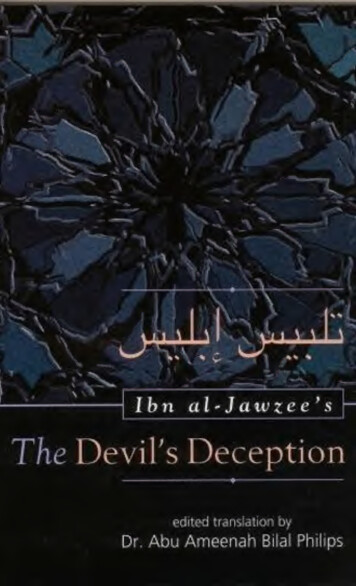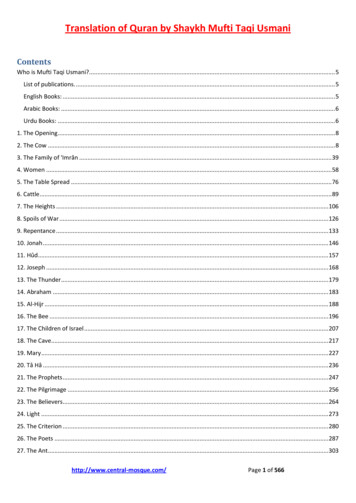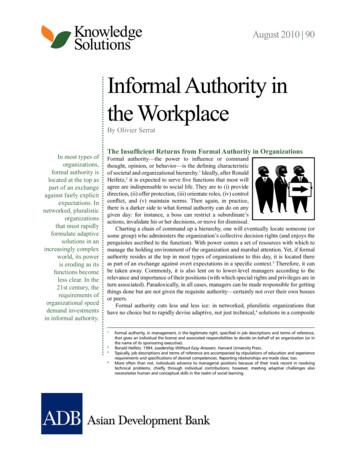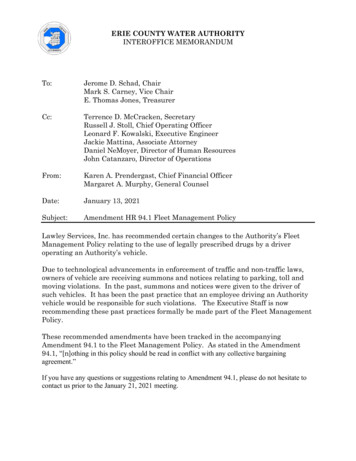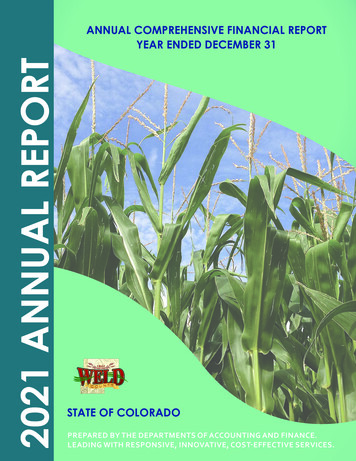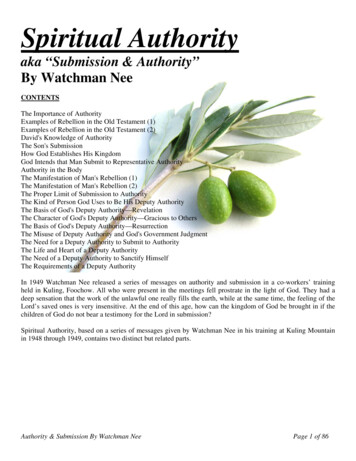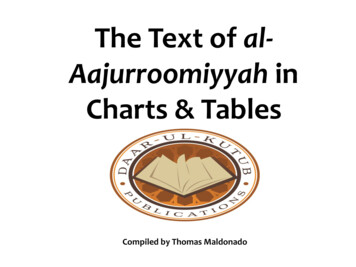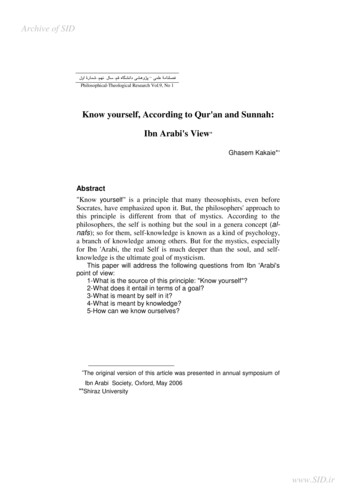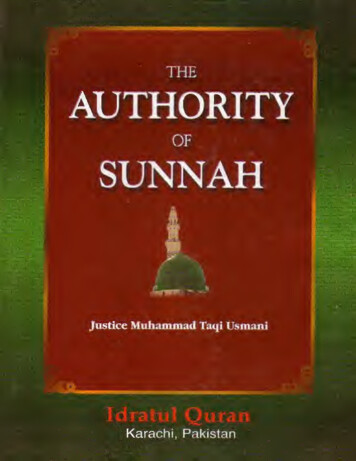
Transcription
THEAUTHORITYSUNNAHJusticeMuhammad Taqi UsmaniIdrattilQuranKarachi, Pakistan
CONTENTSPageForewordChapter31Sunnah: the Second Source of Islamic law5of Sunnah6The status of the Holy ProphetThe obed ience of the Messenger6Definition1Iltiba9(following) of the Prophet18Two kinds of revelation23The second kind of revelation provedby the Holy QuranThe obedience of the Prophet as23distinctfrom the obedience of aruler40Chapter 2The scope of the Prophetic AuthorityThe Prophet's Authority to make lawsThe Holy4545Prophet's Authority tointerpret theHoly Quran53Examples of Prophetic explanationsof the Quran54DocsHoly Quran need explanation?59of the Prophetic authority61theThe timelimitThe Prophclic Authority in worldly affairsThe event of fecundation of the palm-trees6770Chapter 3Theauthenticity of the "Sunnah":historical aspectits75The preservation of Sunnah73Three kinds of Ahad ith7g
The authenticity of the first two kindsDifferent ways of Ahadilh ritingThe compilation of Hadithin thedaysof the Holy ProphetThe did at ions of the Holy Prophet The book of sadaqahThescriptcopy of Amr b.10*HazmWritten directives to other Governors101Written directives for certain delegations102The compilations of Hadith bythecompanions105of the Holy ProphetThescripts of105Abu HurairahThe script of AbdullahibnAmr'06The script of Anas107The script of Ali107Scripts109of Jabir109Scripts of Ibn 'AbbasThe compilation of ahadilhin the'*113the second century'*5The criticism of ahadith118era after thecompanionsThe compilations of theThe books of haditlifirstcenturywritten in1.Scrutiny of the narratorsEM2.Constancy of the chain of nniraiois1233.Comparison with other narrations'254.General analysis of the tradition125Conclusion126
3p- Jl i/**v" 'pi U f)L»j iSjJ ua\ jjJUt ojLpLS-&jlJ-IFOREWORDInOctober 1989,the "Authority of the1wasSunnah"invited to present a paperinonan international conferenceheld in Chicago by an international Islamic organisation.Since long,Ifelt theneed of a brief English bookletcontaining basic information on "The Sunnah of the HolyProphet#", it'sgeneral features, the nature ofit'sauthorityand the standard of it's authenticity.Itook the opportunity tothe subject in aconference oflittlemorefulfil thisdetail thanneed and wrote onwas requiredin athis type.The present work is the result of the above endeavour.This book is meant for the general reader who wantstoknow what the "Sunnah of the Holy Prophet 4&doesithave a binding authority overallthe" is,Muslimshowforalltimes to come, what status has the Holy Quran given toand what measures has thethecoming generations.Ummah adopted to preserveititfor
Ihopethat thisanswershumbleeffort will provide brief, yetof similar nature and will helpunderstanding the true status of the 'Sunnah' as a source ofIslamic Law and as a source of guidance for all Muslims inclear*to questionstheir practical lives.hope in removingcertain doubts inculcated by few contemporary writers inItwill also assist,Ifrespect of the authority of the Sunnah,MayadorneitAlmighty Allah approve ofwith His pleasure and makethisithumbleeffort,beneficial to thereaders.Muhammad Taqi Usmani
CHAPTER1SUNNAH:THE SECOND SOURCE OFISLAMICLAWThe Sunnah of the Holy Prophet Muhammad i§; has beenaccepted as an important source of Islamic law, next in importanceonly to the Holy Quran. This status of the sunnah has remainedunchallenged and undisputed throughout the centuries. There havebeen many differences among Muslims in their juristic opinions,but the authority of the Holy Quran and the sunnah of the HolyProphet was never denied by any jurist. Leaving aside somescattered individualswhostream of the Muslimseparated themselves from the mainpopulation, nobody has ever refused toaccept the sunnah of the Holy Prophet as a sacred source of theIslamic law.Theorientalistspositionisstilland some of theircentury to castsome doubtssame, but some non-Muslimfollowers have tried, during the lastthein the authority or the veracityofHadiih and to develop a suspicious attitude towards the Sunnah.That is why some Muslims who are unable to study Islam throughiisoriginal sources,when ihcybit skeptical in the subject.read such books, oftenbecomea
The presentarticle intends, therefore, toprovide anbased on theAHobjective and simple account of the SUNNoriginal sources of Islamic learning. The purposenot to indulgehot atmosphere of argumentation which has no bounds orlimits, but to narrate Lhc truth as it stands.isin aSVNNAHDEFINITION OFThe Sitnnah has beendefined by the scholars of lhc scienceof Hadith as follows:''"A word spoken or anactgiven by the Holy Prophetdone ora confirmationMuhammad *1'Confirmation in this definition is termed in Arabic asTaqrir. What is meant by this term is like somebody saidsomething, or acted in a particular manner, and his saying or actcameknowledge of the Holy Prophet l.and he eitherconfirmed it in express words or remained silent withoui givingany indication of disapproval. Such silence, being an impliedapproval of the Holy Prophet j is also included in the termto the'Sunnah'.AstheSunnah, withall itsthree kinds (saying, act andconfirmation), relates to the Holy ProphetjSg,,lutrue status inlaw cannot be ascertained without ascertaining the status of The Holy Prophet iS himself.the IslamicTheSo.thefirststatus of theHoly Prophetpertinent question in the subjectis:What statusdocs a prophet occupy when he is sent to the people? Has he nohigher a status than that of a message - carrier or a postman who.
no concern with it whatsoever? Theanswer is certainly in the negative. The prophets arc not sentmerely to deliver the word of Allah. They arc also rcquried toexplain the divine Book to interpret it, to expound it, todemonstrate the ways of its application and to present a practicalexample of its contents. Their duty is not restricted to reciting thewords of the Book, rather they are supposed to leach it and toafter delivering the letter, hasttrain people to run their lives inThe Holy Quranleaves\j—J rt accordance withno doubt concerning **J4 -JU Jl J itsrequirements.this pointby saying: y4 J2i-OJV*Allah has surely blessed ihe believers with Hiswhen He raised in their midstfrom among themselves, who recitesfavourMessengerto them Hisaverses and makes them pure and teaches llicm theBook andthewisdom, while they were,earlier, inan open error (3:164).S-ttiC JIj c-jllxJt /v -oJLajjHeis ic-therecites the verses of Allah,leaches them theThe same jLjIOne who raised up, among theMessenger from among themselves who(Allah)unlettered, ap -Ojj Book andand makes them pure andthewisdom. (62:2)functions were attributed tothe prayer of Sayyidna IbrahimHoly Quran, he prayed:f%J\Holy Prophet *§. inwhen, according to thethe*JL&
j rSJj il&Jl)Lil Cli 4 i 1Our Lord, raise in their midst a messenger fromamong themselves who recites to them Your versesand teaches them the Book and the wisdom andpurifies their. (2: 129)These arcProphet whichProphet* the terms or reference given to the Holyinclude four distinct functions and the Holyhas been entrusted with all of them:(1) Recitationtheof the Verses of Allah.(2)Teaching the Book of Allah,(3)Teaching the Wisdom.(4)Makingdie people pure.Thus the Holy Quran leaves no ambiguities in the fact thatHoly Prophet is not supposed to merely recite the versesand then leave it to the people to interpret and apply them inwhatever manner they like. Instead, he is sent to 'teach* theBook. Then, since teaching the Book is not enough, he is alsoTcquircd to leach "Wisdom" which is something additional to the"Book". Still, this is not enough, therefore the Holy Prophet Sphas also to 'make the people purc' meaning thereby that thetheoretical teaching of the Book and the 'Wisdom' must befollowed by a practical training to enable the people to apply theBook and the wisdom in the way Allah requires them to apply.fThis verse of the Holy Quran describes the followingfunctions of the Holy ProphetJf;(a)HeisHehas the final word in the interpretation of the Book.the authority in thewaytheHoly Book hasto berecited.(b)
He(c)isthe only source atwhichthewisdom based ondivine guidance can be learned.He(d)toisentrusted with the practical training of the peoplebring his teachings into practice.These functions of the Holy Prophet 1§ can never becarried out unless his teachings, bolh oral and practical, arc heldto be authoritative for his followers, and the Muslims who arcgiven under his training arc made bound to obey and follow him,and 'c\ namely, the teaching of the Book andThe functionsWisdom require that his 'sayings' should be binding on theVfollowers, while the function *d\ the practical training, requiresthat hisracts'should be an example for theununah should be boundIt isto followummah, andtheit.not merely a logical inference from the verse of theHoly Quran quoted above, but it is also mentioned in expressterms by the Holy Quran in a large number of verses which givethe Muslims a mandatory command to obey and follow him.While doing so, the Holy Quran has used two different termsnamely, ihe 'ita'ah' (to obey) and the 'itiiM (lo follow). The firstterm refers to the orders and sayings of the Holy Prophet 1,while the second rclalcs to his acts and practice. By ordering theMuslims both lo obey and lo 'follow' the Holy Prophet .'',lli Holy Quran has given an authorityThe obedience ofItisin thistobothhis sayingsandacts.the MessengerQuranbackground that the Holyrepeatedly on 'the obedience of the Prophet' somuchso thatmentioned side by side with, the obedience of Allah,Sito WjSbliJ JIjM\jX\ i l'Say,'ObeyAllah and the Messenger buLturn their backs'rffiifinsiststheyAllah loves not the disbelievers'.it is
And obey Allah andmay be blessed, (3:132)Owhothosebelieve,Messenger and thoseAnd obeytheMessenger sothaiyouobey Allah and obeythein authorityamongyou. (4:59)Allah and obey the Messenger andbeware. (5:92)ij*J*ij /vSjuj4i)idbl »JU*lj40)1ljZ»USo, fear Allah and set things right between youand obeyAllah and His MessengerItyou arcbelievers. (8:1)Owhoobey Allah and HisMessenger and do not turn away from him, whileyou arc listening (8:20)thoseAnd obeybelieve,Allah and His Messenger and do notquarrel with each other, and so lose heart (8:46)
11Say, 'Obey Allah and obey ihc Messenger; then,you tum away, upon him rests what is laid onhim, and upon you rests what is laid on'you. IT youobey him, you will be guided". (24:54)ifjiaat \j j% 'S j\Owhoobey Allah and obey theMessenger and do not make your deeds vain.thosebelieve,(47:33) *f* So, establish salah and pay zakah and obey Allahand His Messenger (58:1 3) i SMi Wt u J»And obey Allah and obey the Messenger, but ifyou turn your backs, Our Messenger has only todeliver the manifest message. (64:12)obedience of the Messenger' has beenordered as an obligatory command. There arc oiher verses inwhich the results of the 'obedience of the Messenger' have beenIn these verses 'thedescribed. Here again the 'obedience of the Messenger' has beencombined with'theobedience of Allah*:
131 4JU* And#1j JaJjlikljl *Jj*-jj blthe believers,3lSjJl*oy i3 SiLJImen and women,of each other; ihcy bid theJ UjjJIUU4V4J1JA iOlU*tjjl#faira e friendsand forbid the unfair;they establish salah and pay zakah and ihcy obeyAllah and His Messenger.whomThese arc those uponAllah shall have mercy; AllahisAll-Mighty,All Wise. (9:71)i *you obey Allah and His Messenger, He willnot diminish you anything of your deeds. (49: 14)IfThe Holy Quran has also made it clear that 'the obedienceof the prophet* is not a new principle, nor is it limiicd to the HolyProphet Muhammad - The same principle applied to all theformer prophets who came before him:.And weno messenger, but that he should beleave of Allah. (4:64)scniobeyed by theby the Holy Quran thai the prophets arcthe spokesmen of Allah's pleasure. Hence, the obedience of theIt isprophetisalso clarifiedactually the obedience of Allah Himself.
14And whoever obeysihc Messenger, therebyobeys Allah. (41:80)Asthe obedience or theHoly Prophet Jg& has been stressedby the Holy Quran and has been combined v/iLli the 'obedience ofAllah" in the same way hisdisobedience* has been warnedagainst and is combined with the disobedience of Allah*' li-Ju 43jJl -':J** J J "JJAnd whoever disobeys*W 0**HAllah and(J*JMessengeridmil him toIllsand transgresses His limits, He shallFire where he shall remain forever (4:14)And whoever disobeysAllah and His Messengerhas gone astray into manifesterror. (33:36)(lip l JjAnd whoever disobeysforhim thereshallis jj\ .Allah and His Messenger,the fire ofJahannam. There Ihcyremain forever. (72:23)And whoever makesMessenger, then Allahmmand Hispunishment.a breach with Allahissevere in
15Did ihcy not come 10 know liiat whoever opposesAllah and His Messenger, for him there is the fire ofJahannamn(9:63)1Thus, both positive and negative aspects of lhc 'obediencehave been dealt with in the Holy Quran and the 'obedience of lhcHoly Propheteach one of these verses has been mentionedseparately, alongwiih the obedience of Allah:'in1noteworthy that whenever the 'obedience of Allah ismentioned in the Holy Quran, it is always followed by theIt isobedience of the Prophet* which has never been missed even in asingle verse.Thereisno verseBook wherein the entirethe'obedience of Allah' has been mentioned alone with no referenceto the'Obedience of the Messenger*.OnsomeLhc contrary, there arcverses where only the'obedience of the Messenger' has been mentioned, and therereference to the 'obedience of Allah1:-And And.',-*. you obey himiflhc right path. (24Onmay:i-4tpay Zakah and obey Lhcestablish salah andProphet, so Lhal you*be blessed. (24:56)t rt f (the Prophet),youshall find54)day those who disbelieved and disobeyedthe Messenger will wish that the earth might bethatlevelled wilh them. (4:42)isno
16.J&KM d»L*J f** And whoever makes aafter the right path has4* \jbreach with the Messengerbecomeclear to him,andway other than that of the believers, Weshall let him own what he chose and shall admit himin the Jahannam. and it is evil as a returning place.follows a(4:115)muchupon the 'obedience of theProphet' is that the obedience of Allah' cannot be carried outAllah docs notexcept through the 'obedience of the Prophetaddress each and every individual to tell him what He requiresfrom him, as the Holy Quran puts it;The reasonfor sostress1.Lij U Oj Andit is J"ilj-j *Lyhuman beingthatJ-jjnot possible for aj»vAllah should speak to him, except by revelation, orfrom behind a curtain, or that He should send amessenger and he reveal by His have whatHewills. (42:51)Therefore Allah conveys His injunctions only through H:sprophets, and his obedience cannot be carried out except by theobedience of the messengers. So, when a prophet bids somethingor forbids something, he docs not dorather,he docs soin the capacityitin his private capacity,of a messenger of Allah.WhenAllah Himself has given an express command 'to obey theMessenger the obedience of the Prophet is actually the"obedience of Allah , though in an indirect manner. This point1,1
17has been clearly established by the Holy Quranwords:*** if fi'"And whoever obeys"V*6iii in thefollowing**ihc Messenger, therebyobeys Allah. (4:80)So, whenever only the 'obedience of the Messenger' hasbeen mentionedHoly Quran it includes, without saying, the'obedience of Allah' because the Messenger docs not say anythingin the capacity of a Messenger unless he is guided by a revelationin thefrom Allah:if-M y*S% S* Oj & \0 jl*4 UjAnd he (the Prophet) docs not speak out ofown desirc. It is not but a revelation revealedhis(tohim) (53:3)Lookedatfromthis angle* theobedience of the Prophet Sjrepresents the obedience of Allah and the reference to the formeralways includes the latter That is why the Holy Quran in some,verses deemeditsufficient to refer to the obedience of theMessenger only, for theobey the prophet.Onpracticalthe contrary, thewaytoobey Allahisonly toHoly Quran did not deem it sufficientof Allah* without referring to theto refer to the 'obedience'obedience of ihc Messenger',remove even the remotest excusefor ignoring the 'obedience of the Prophet* and to leave no doubtwhatsoever in the fact that the 'obedience of Allah* is not completetounless the 'obedience of the Prophet*implications.1isfullyobserved withall its
18(following) of the Prophet*Ittiba'The second term used byprophetsis the' ittlba\ i.e. totheHoly Quranin respcelfollow:you love Allah, follow me and Allahlove you and forgive you your sins (3:31)Say,CiJJlif 1 JJiJj JlJygtJglj Sljjlll iThose who followProphetdiewhomU**r wiltd *-*AJLLfr \jjZ& 4AjjJshjthe Messenger, the unletteredihcy find writtendownwith them inTorah and the Evangilc. (7:157)of'y.c JJl 1 yr l.-Jj-jj-uAj (*i#UJjOlyJ pXLJ « ljOUlSj4JDbBelieve, then, in Allah and His Messenger, theunlettered Prophet,whobelieves in Allah and Hiswords, and follow him so that youmay be ontheright path. (7:157)Allah has surely relented towards the Prophet andthe Emigrants and the Helpersan hour of difficulty(9:1 17)whofollowed himinof the
19OwhoProphet, sufficient to youisAllah and thosefollowed you of the believers (8:64)« Mli D rjJ!UjU*Jlj cJjpltulb&(The believers say:) Our Lord, wc have come tobelieve in what You revealed, and followed theMessenger. So, write us among those who bearwitness. (3:53)iJ LVSTjm-itJ\ j&m uf? * * d** *&Say,"Thisknowledge,1ismyway.Icall lo**V **jj SBjf'-'I'And WchimyAllah with sureto Ibrahim are those"'* '*Sl* *?-»'MlCrt *"*set in the hearts(Jesus) tenderness andjll!* *and whoever follows me." (12:108)The closest of the peoplewho follow him. (3:68)'*1VJ**c5*of thoselit" -Jwhofollowedmercy (57:27)J&Q V* 3 j CAnd warnf-*r IfA J&Jwhenwho didthe people of the dayiheevilpunishment comes on them and those"Our Lord, defer us to a near term, andshall d shall follow the
20And Wedid not appoint the Qiblah on which youwere earlier, but thatmight know the people whoWefollow the Messenger, as distinct from thoseturn back on their heels (2:143)Hesaid,'My people, followwhothe messengers'.(36:20)(Mosessaid:)And your Lord(the All-Merciful).So, followismethe 'Rahman'and obeymycommand. (20:90)j a iiisiill 'Wlj &\J* (Yt* ljj UI)So, they (the disbelievers) said, 'Shalla singleIjftaiwefollowhuman being from among us? Then, indeedweshould be in error and insanity*. (54:24)AHthese verses, with different styles and connotations, laya strong emphasis on the necessity of 'following the prophetsand indicate that whoever believes in a prophet is bound to1, follow' him.Theis obvious. The prophets arc sent to thepeople to set a practical example of what they teach and preach.Their message is not confined to their oral teachings Their actsare equally important in any effort to discover, learn and followreason.the rightway of living. The Holy Quranisquite explicitonthis
21pointwhen it was( X\»said inuJyS\Surah al-Ahzab:)There is surely a good example for you in theMessenger of Allah, for the one who hopes (to meet)Allah and the Hereafter, and remembers Allah1abundantly/ (33:21)It isan established factthatmeretheoretical educationcannot be sufficient for reforming a people. Ttye natural way ofreformation is to set a practical example which people may follow.Merc reading of books cannot makeor an, unless heskillful artistisofmedical science,a person perfect in a sciencesimultaneously trained by a senior scholar or asomebodybut docs not work underthat field.Ifbooks ofthe supervision of anstudies theexperienced doctor, he despite his thorough study/cannot claim toserve as a doctor nor can such a person be allowed to play withthe lives of the patients.Ifsomebodystudies books of law, he cannot claim to be alawyer unless he acquires a practical training from a senior lawyerand remains for a considerable lime under his juniorship.Even a plain enthusiast who wants to cook a good mealcannot do so perfectly by merely studying the books written onthe subject, althoughthe ingredients required for cooking thebook and even the minute details of thedescribed. But a person who has never cookedfood arc mentionedprocess arc fullyallin themeal before cannot prcpaie it just right and perfect with thesole help of a cook - book unless he is practically trained by someexpert. That expert sets a practical example for him and he, byfollowing the example, gradually learns how to cook that goodthatmeal.
22ftpracticalshowsclearlyexampleis tine in theThatthathuman beingsin order to learnarc always in need of aan important subject. The samematter of religious leaching and training.iswhyAllah did not choose to send the divine booksHe always sent a messenger with the book. There arcmany prophets who came without a new divine book. But thereis no divine book sent down without a prophet. The disbelieversof Makkah, too demanded many times that ihe Book should beonly.frevealed to them without the mediation of the Holy Prophet But the demand was rejected and the Book was sent throughHoly Prophet j§. .The reasonis.theobvious. Humanity did not need a divinebook only. It also needed a teacher who could teach them thecontents of the Book. It also needed an instructor who could trainthem and could set a practical example for them without whichthey could not benefit from the Book in their practical life. It wasfor this reason that the Holy Prophet i p was sent with a cleardirection to all human beings that they arc bound to obey andfollow him and to leam the details of Allah's pleasure through thepractical example set before them by him. It was also clarified inthe foregoing verse of the Holy Book that the 'obedience of theMessenger' is actually the 'obedience of Allah and that the latter1cannot be carried out except through the former, because whatever Holy Prophetsays or docs in the capacity of a prophet isbased on the revelation received by him from Allah. Thus, hissayings and his acts both, even though they arc not contained inthe Holy Quran, are inspired or confirmed by the divinetherevelation.
23TWOKINDS OF REVELATIONItthefollows from the foregoing discussion that the revelationHoly Prophet:§ receives from Allahisof two differentkinds:Quran the Holy Book, named in theIslamic terminology as aj-wahy al-matluww (the recited revelationi.e. the revelation which can be recited in the prayers). This kindof revelation is confined to the verses of the Holy Quran and is(i)the revelation of thewritten verbally intits folds.by the Holy Prophet ig; fromtime to time to let him know the pleasure of Allah in day -to-dayaffairs and the details of the principles laid down in the Holythe revelation received(ii)This kind of revelation iscalled al-wahv ghair-al-matiuww (the unrccilcd revelation). Thiskind of revelation ife not conveyed to the people verbally. It hasbeen demonstrated through the sayings and acts of the HolyQuran withProphettheir correct interpretation. .THE SECOND KINDOF REVELATION PROVEDBY THE HOLY QURAN.This second kind of revelationQuran, but the Holy Quranbut attributesitsitselfisnot contained in the Holynot only refers tocontents to Allah Almighty.itfrequentlySome verses of thebelow which clearly prove that the'revelation is not confined to the Holy Quran, but there is anotherkind orwahy' which docs not form part of the "Holy Book", yetHoly Book1arc reproduced
24itisLhc revelation from Allah Almighty:The Holy Quransays:Wc did not appoini Lhc Qiblah on which youwere earlier but that Wc might know the people whoAndfollow the Messenger as distinct from thoseturn backonIn order tobackgroundintheir heels. (2: 143)understand the verse,whichIn the earlywhoilwasilisnecessary toknowtherevealed:daysotMadanilife, aftertheHoly Prophet'smigration to Mactinah, the Muslims were ordered to direct theirfaces in prayers towards Byttd-MaqcUs (Jerusalem) which hadbeen appointed as Qiblah of the Muslims. Upto seventeen monthsthe Muslims had been observing the Bytul-Maqdis as their Qlhtaluwasseventeen months that lhc Holy Quran abrogated theearlier order and the Muslims were required to observe the HolyItafterMosqueMakkah as their Qiblah and turn their faces towards ilwhile praying. The following verse was revealed to appoini theofDQwQiblali:So, turn your face lo wards Al-Masjid-al-Haram.(2:144)Thisneworder was criticised bywhysomedisbelievers andwas appointed asQiblah earlier. The above quoted verse (2:143) was revealed loanswer this objection. The answer was that the appointment ofthe former Qiblah was in order to test the people whether or notthey objected onitas tothey follow the Messenger.the Bylul-MaqdisTo quotethe verse again:
25"earlierwhoAnd Wc(i.e.did not appoint the Qiblah on which you wereBytul - Maqdis) but that Wc might know the peoplefollow theMessenger"Here the appointment of the previous Qiblah has beenattributed to Allah Almighty which is a clear indication to the factthat the appointment of Bytul - Maqdis as Qiblah was done by theorder of Allah Almighty Himself. But this order is nowhere in theHoly Quran, and there is no verse in the Holy Book which directsthe turning of faces towards Bylul-Maqdis. This order was givento Muslims by the Holy Prophet g with no reference to anyverse of the Holy Quran. Still, this order was mentioned by theHoly Quran in the above quoted verse as the order of Allah: Thewords:"Wcpointdid not appoint the Qiblah" instead of the words:"The Holy Prophet did not"to need more explanation.arc loo clearonthisThis statement of the Holy Quran, thus, evidently provesthat the previous order given by the Holy Prophetwas basedon a revelation which did not form part of the Book. And this isexactly the Unrccilcd revelation \ The verse of the Holy Quran '(2:143) quoted above proves the following(a) theHoly Prophet usedwhich arc not contained(b)in thesomerevelationsHoly Quran.Allah Almighty.The orders based on suchthe believers asrevelations(d)receiveThese revelations were from Allah Almighty, so muchso that the orders based on such revelations wereattributed to(c)toTacts:i.e.,revelation were as binding onthe orders of the firstthe verses ofkind orHoly Quran.These orders were sometimes given so as to test whetheror not tlic Muslims follow the Messenger JSj irrespective
26of ihc questionQuran orthat his orders arc contained in ihcHolynot.beginning one of ihc rules followed by therespect of the fasts of Ramadan was that even a short2, In theMuslimsinnap after iftar (breaking of a fast) would nullify the permissibilityof having sexual intercourse with one's wife. So, if someonewould sleep for a short while after iflar and wake up again, hewould losethe opportunity of sleeping with his wife during thewas over. This rule waspresccibed by the Holy Prophet - and was not contained in theHoly Quran. But some Muslims broke ihc rule by sleeping withrestof the night, despite that thefastwives after having a post-iftarnap. Referring to these events,ihc Holy Quran first admonishes those people who did not followtheirby abrogating the same allows the Muslims infuture to sleep with ihcir wives even when they had a nap afteriftar. In this context the Holy Quran says:the rule. Then,-** * *L-j J! jJl f\?* *lytk (vavf&j\iIi is Iii J u**t at* tSJLJ «f« j J l j\ j i *y Ol Ijlufs ii)jlilmadelawful for you, in the nights of fasis, toJJhave sex with your women. They arc a cover foryou, and you arc a cover for them. Allah knew thatyou were betraying yourselves;towards you and pardoned you.so,So,He relentednow you canhave sexual intimacy with them, and seek what Allahhas destined for you, and cat and drink until the
27white thread of ihcdawn becomesdistinctfrom theblack thread; then complete the fasts upto the night.(2: 187)The following points withrespect to this verse arc worthconsideration:(a)The verse confirms thai having sex during'Ramadan' was not lawful before,(b)The people who hud sex during the nights of Ramadanbefore this verse was revealed, arc admonished bythe nights ofdescribing their act as 'betraying themselves'.(c)The words,'soHerelented towards you and pardorcdyou', indicate that their sexual act(d)wasa sin, because'relenting'and 'pardoning' occur only after a personcommits asin.now you can have sexual intimacy withdenote that it is only now that the sexual actThe wordsthem*'soduring the nights of Ramadan has beenmadelawful.All these points confirm the fact that the earlier prohibitionof having sexual intercourse during the nights of Ramadan wasvalidly made by a competent authority, and the Muslims wereboundto abidebyBut thereprohibition.Ititno verseHoly Quran to convey thiswas enforced only by ihc Holy ProphetStill,isin theHoly Quran not only confirmsits own words. It is due to theJgtheitinfact that,bui also treatsdid not enforce this prohibition by hiswcrcthe Holy Prophetownatproves that thereHoly Quran,fromisthis angle, this versea revelationitisitititwasrather,not containedoninthe one fiandwhich docs nut formand on the other hand,as if will,based on a revelation of Allah Almighty whichthe Holy Quran.Looked,part of thereaffirms the status of ihc
28Holy Prophet ;as a law-giver, andorders and prohibitions, arc binding on3,Onthat his injunctions, boththe Muslims.some Quranicthe accasion of the battle of Uhud,verses were revealed tomakeMuslims recall the events of theAllah helped them and how He promisedBaulc of Badr: Howihcm to send the angels toThese verses arc as under:-oilthetheir aid,ljjJ\i ij l*I}iand how He actually didj jjuj4U1 fOj-AJJlIItiSyL l s \\ Li J T iblL JCjj J J-J jliB.***""«,\1' *".'(\T6 - \Y-Yi Jtj Jl) ( *Allah has certainly helped youwere weak.grateful.atBadr while youSo, fear Allah, so thai youWhen you (Obelievers, "Shallitlmay beProphet) were saying to thenot suffice you that your Lordyou with three thousand angels being sentdown? Why not? If you observe patience and fearAllah and they come to you in this their heat, yourLord shall aid you wiih five thou
Theauthenticityofthefirsttwokinds DifferentwaysofAhadilhpreservation 1.Memorization 2.Discussions 3.Practice Writing ThecompilationofHadithinthedays oftheHolyProphet .


